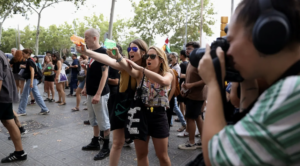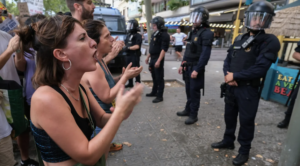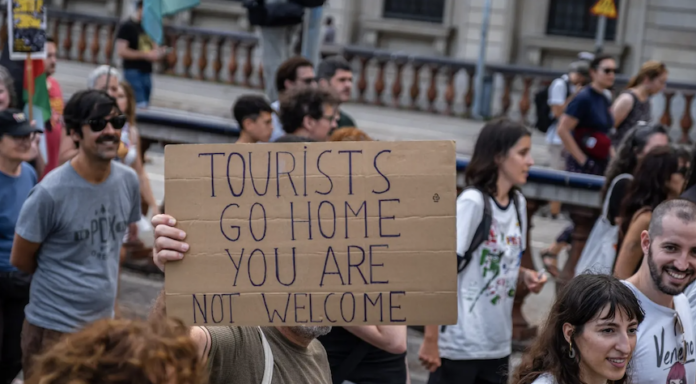Residents of Barcelona vented their frustrations at the increase in mass tourism this weekend by spraying water guns and demanding that tourists leave popular locations around the city.
“Enough! Let’s limit tourism” was the rallying cry of the thousands – 2,800 according to Catalan news – who gathered in the center of the city on Saturday night and marched to the major tourist attractions.
The organizers claimed that this protest was a way to express the “discomfort” that local officials felt in Barcelona due to the increased tourism. Local officials blamed the increase in mass tourism for increasing the cost of housing and living, making it hard for locals in Barcelona.
Housing activists, neighborhood associations, and ecologists all joined in the discussion and claimed that the “enormous impacts” on employment, society, and the environment had made it “impossible for locals” to live there.
Euronews reported the organizers’ claim that the increasing number of tourists, around 12 million a year – many of whom arrive via cruise ships – also puts pressure on health services, waste disposal, and water supply.

Barcelona’s mayor Jaume Colboni announced that he would eliminate the roughly 10,000 short-term rental units in the city by 2028. However, housing activists claim the legislation will lead to more hotels.
Barcelona is the latest European tourist destination that has complained about the increase in tourism and the strain the city must bear.
BBC reported that activists on the Canary Islands, off the coast of Africa, but owned by Spain have been on a hunger strike to stop the construction of new hotels. After 20 days of protest, the organizers decided that officials showed “zero concern” for their well-being. However, construction was briefly stopped due to environmental concerns.
Residents of the island have asked the government to abandon plans to build more hotels on the islands. They used slogans to remind them that people “live here” and “don’t wish to see our Island die.”
Florence, Italy announced last year a ban on short-term rentals. It defines this as any property occupied for less than 30 consecutive days by a single person. The Associated Press reported that while Mayor Dario Nardella acknowledged last year that the law would be met with opposition, he still believed it to be fully and legally defendable.

Nardella argued at the time that locals were living in “apartment hotels” because the number of apartments on Airbnb had risen from 6,000 in the city to more than 14,000 in only five years. The city will not remove the 8,000 listings from the city center but instead convert them to other uses.
Venice, Italy officials angered locals when they introduced a 5-euro “day-tripper’s” entry fee into the city center. Advocates argued that the fee did little to discourage visitors, and only filled the city coffers, while the supply of apartments remained limited.
Susanna Polloni of the Solidarity Network for Housing in Venice told reporters that “it is a further step towards the Venice we don’t want, the museum city. It is a step toward normalizing this image which is more dangerous as it becomes more entrenched in the international imagination.”
Polloni added, “This measure helps make it more concretely real.” “A city devoid of soul and residents, as the tourist monoculture has devoured everything that is needed to make a city liveable: housing, public services and shops, and protected employment.”










